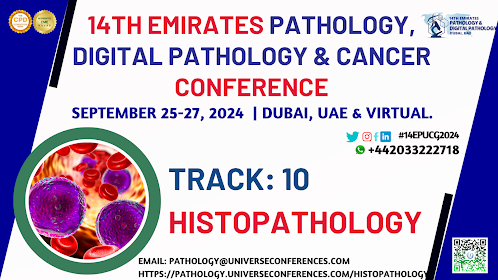The Future of Diagnostic Pathology: Innovations and Impacts
Introduction:
Diagnostic pathology is a cornerstone of modern medicine,
providing critical insights that drive patient care, treatment decisions, and
outcomes. As the field continues to evolve, innovations in technology and
methodology are enhancing the accuracy and efficiency of diagnoses.
In this blog, we'll explore the latest advancements in diagnostic pathology and
their implications for healthcare.
The Role of Diagnostic Pathology:
Diagnostic pathology involves the examination of tissues and
cells to identify diseases. Pathologists
play a pivotal role in diagnosing conditions ranging from infections to
cancers, often serving as the bridge between the laboratory and the clinic.
Their expertise is crucial for accurate disease diagnosis, guiding treatment
plans, and informing prognosis.
Digital pathology is revolutionizing the way pathologists
work. By converting glass slides into high-resolution digital images,
pathologists can view, share, and analyze specimens on computer screens. This
technology offers several benefits, including:
Enhanced
Collaboration: Digital slides can be easily shared with specialists
worldwide for second opinions.
Improved
Workflow: Digital pathology systems streamline the workflow, allowing
for faster diagnosis and reducing turnaround times.
Storage
and Retrieval: Digital storage solutions eliminate the need for
physical slide storage, making it easier to retrieve and review past cases.
Artificial
Intelligence (AI) and Machine Learning:
AI and machine learning are being integrated into diagnostic
pathology to assist in identifying patterns and anomalies that might be missed
by the human eye. These technologies can:
Automate
Routine Tasks: AI can handle repetitive tasks such as counting
cells or measuring tumor margins, freeing pathologists to focus on more complex
cases.
Enhance
Diagnostic Accuracy: Machine learning algorithms can analyze
large datasets to provide diagnostic suggestions, increasing accuracy and
consistency.
Predictive
Analytics: AI can analyze data trends to predict disease
progression and treatment outcomes.
Molecular pathology focuses on the analysis of DNA, RNA,
and proteins to understand the molecular mechanisms of disease. This subfield
has become essential for:
Personalized
Medicine: Molecular diagnostics enable tailored treatment plans based
on the genetic profile of a patient's disease.
Early
Detection: Molecular markers can identify diseases at an early
stage, even before symptoms appear.
Targeted Therapies: Understanding the molecular basis of
disease helps in the development of targeted therapies that can more
effectively treat conditions like cancer.
Challenges
and Future Directions:
While technological advancements are transforming diagnostic
pathology, they also bring challenges:
Integration and Implementation: Adopting new technologies
requires significant investment in infrastructure and training.
Data
Management: The shift to digital and molecular diagnostics
generates vast amounts of data, necessitating robust data management and
security measures.
Regulatory and Ethical Considerations: Ensuring the ethical
use of AI and patient data, and navigating regulatory frameworks are ongoing
concerns.
Looking ahead, the future of diagnostic pathology is
promising. Continued advancements in technology and a growing emphasis on
personalized medicine will further enhance the role of pathologists.
Integration of AI and machine learning will augment human expertise, leading to
more precise and timely diagnoses.
Diagnostic pathology is at the forefront of medical
innovation, continuously evolving to improve patient care. The integration of
digital pathology, AI, and molecular techniques is transforming the field,
offering unprecedented opportunities for accuracy, efficiency, and personalized
treatment. As these technologies continue to develop, pathologists will be
better equipped to meet the challenges of modern healthcare and deliver
improved outcomes for patients worldwide.
Stay informed about the latest developments in diagnostic
pathology by subscribing to our blog. Share your thoughts and experiences in
the comments below, and join the conversation about the future of this exciting
field.
Conference
Name: 14th Emirates
Pathology, Digital Pathology & Cancer Conference
Short Name:
14EPUCG2024
Dates: December
17-19, 2024
Venue: Holiday
Inn Dubai, UAE & Online
Email: pathology@universeconferences.com
Visit: https://pathology.universeconferences.com/
Submit here: https://pathology.universeconferences.com/submit-abstract/
Register here: https://pathology.universeconferences.com/registration/
Online Registration here: https://pathology.universeconferences.com/virtual-registration/
Call Us:
+12073070027
WhatsApp us at:
https://wa.me/442033222718?text=
#DiagnosticPathology #DigitalPathology #MolecularPathology
#CancerDiagnosis #PathologyResearch #Histopathology #Cytopathology
#SurgicalPathology #AIinPathology #ClinicalPathology #Telepathology
#PathologyInnovation #PathologyEducation #PathologyWorkflow #PrecisionMedicine
#PersonalizedMedicine #PathologyTech #PathologyLab #PathologyUpdates
#MedicalDiagnostics
.png)


.png)
Comments
Post a Comment